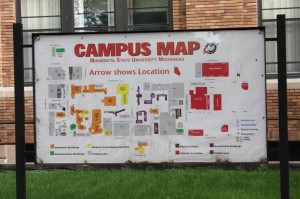
Does your choice of undergraduate major affect your religious faith? Inside Higher Ed recently reported on a study by Miles S. Kimball, Colter M. Mitchell, Arland D. Thornton and Linda C. Young-Demarco, all of U. Michigan, that asked that very question. Using data from the long-running Monitoring the Future study, Kimball et al. tracked the religiosity of college students (based on how frequently they attended religious services and how important they viewed religion in their lives, along with some secondary indicators) to see how their choice of college major affected them.
Photo: Campus map of Minnesota St.-Moorhead by xavierla, via Flickr. Did you ever choose a class based on how close it was to your dorm or parking lot? I never did, I swear.
What did they find? In (very) brief,
- Education or Business major increased religiosity.
- Humanities or Social Sciences major decreased religiosity.
- Biological or Physical* Sciences major had no effect on religiosity.
*Physical science majors showed a decrease in how important they viewed religion, but no change in how often they attended services. Biological sciences had no effect on religiosity.
Remember: this wasn’t which majors were chosen by religious students. It was the change in their religiosity over the course of their undergrad career. In fact, they found that very religious students tended to choose either education or humanities, with quite different results. Kimball et al. acknowledge that religious belief is a complicated matter, and that no one factor is all-determining. They focus on majors in their study because they think that the influence of academic disciplines, while subtle, shape students’ thinking in important ways over time. I expect that most college faculty would hope that their academic work would mark students’ thinking in some way, but perhaps that’s a topic for another time.
[I must apologize here to the researchers for summarizing their findings in such a crude way! If you’re interested in the full paper, you can purchase it for $5 from NBER.]
Kimball et al. theorize that, despite the popular view of science as an enemy of religious faith, the scientific worldview doesn’t actually impact religious faith all that much. Instead, they posit that Postmodernism —most prevalent in the humanities and social sciences —is more corrosive to religious faith because of its relativism:
Postmodernism is associated with epistemological doubt —the idea that knowledge and certainty are extremely difficult to attain. This position suggests that instead of knowledge being given absolutely, it is constructed by human beings through their sometimes faulty capacities of observation and reasoning. This epistemological doubt comes into conflict with religious beliefs suggesting the existence of absolute knowledge, truth, and authority rooted in God’s revelation and teachings to human beings.
They also consider the possibility that Postmodernism, ultimately, is no more or less corrosive than any other position, but that it’s simply newer. As a result, religious teachers have had less time to develop defensive arguments.
What do you think of their findings? Have you seen different majors affect students in different ways? Do you agree with the idea that Postmodernism damages students’ religious faith? Do you have any alternate theories? (I have one, but I’ll save it for later.)
The former Associate Director for the Emerging Scholars Network, Micheal lives in Cincinnati with his wife and three children and works as a web manager for a national storage and organization company. He writes about work, vocation, and finding meaning in what you do at No Small Actors.

Aside from its being a muddle, postmodernism is hardly much of a challenge to religion. The real challenge comes from “The Scientific Worldview: Beyond Newton and Einstein (Understanding the Universal Mechanism of Evolution).” Real “scholars” of religion cannot afford to ignore it.
Glenn Borchardt
http://www.thescientificworldview.com
Glenn,
Thanks for the book plug, and I wish you well on your project. If you look at the study, though, their conclusion is exactly the opposite of yours. Whatever you may think of postmodernism, its default stance of “epistemological doubt” does an incredible job of encouraging students to question all metanarratives – religious OR scientific.
Micheal:
That is why I call it a “muddle.” It leaves the student with nothing to believe in. And, I suppose you are right. Like anarchy, agnosticism may be the first step in the revolution for many folks. The next step is to read TSW.